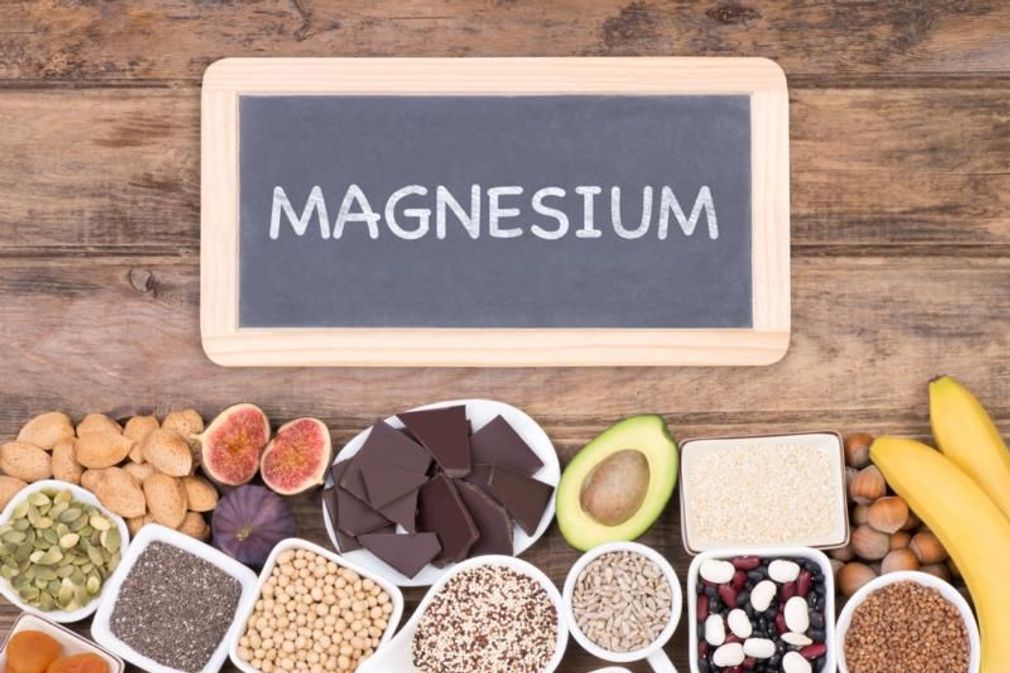If you want to stay zen throughout your life, make sure you never run out of magnesium. This salt mineral is not only the preferred ally of the calciumIt's also the fatal weapon against all forms of stress. Indispensable for the body, you need an optimal daily intake of magnesium to keep up the pace and keep up with the pressure. That's all it takes!

What is magnesium?
Magnesium is a mineral that plays a major role in the proper functioning of our body..
In practical terms, it is responsible for around 300 metabolic reactions in our body. These include the health of our bones and teeth is ensured by the presence of magnesium in our bodies. These elements concentrate around half of the body's magnesium, while the rest is found mainly in the liver, muscles and soft tissues. Any excess magnesium is automatically eliminated by the kidneys.

What is magnesium used for?
Visit magnesium plays a key role in cardiac function. It mainly handles nerve transmission and muscle relaxation after contraction.
We need magnesium to maintain a regular heartbeat, regulate blood sugar levels, ensure the metabolism of lipids and stabilize blood pressure.
This content is part of the guide Blooness, the guide to the ideal human diet, the summary of which you can find here 🌱🥑
This mineral is involved in neuromuscular transmission of nerve impulses and regulation of cardiac rhythm. Magnesium is also involved in lipid metabolism, glucose breakdown to promote energy release, synthesis of proteinsas well as the activity of certain hormones such as insulin. In fact, magnesium deficiency promotes insulin resistance (inefficiency of insulin).
Because it relaxes smooth muscles, magnesium helps dilate blood vessels and ensures nerve conduction. This is why doctors sometimes advise us to take magnesium to relieve certain types of pain associated with migraines, premenstrual syndrome or menstruation.
Because of its muscle-relaxing and anti-stress properties, magnesium is particularly recommended for athletes, and in general for people exposed to stress in their working lives. This is why many athletes, especially body-builders, take magnesium supplements from time to time.

According to some scientific studies, sufficient magnesium intake also helps prevent type 2 diabetes and cardiovascular disease. Like the calcium and the vitamin D, its action against osteoporosis is also recognized by many specialists. A sufficient intake of magnesium is also required to treat constipation.
What is the ideal magnesium dosage?
In general, the recommended individual intake is 6 mg per kilo of body weight per day, i.e. an average of 360 mg for women and 420 mg for men.
For children, we recommend a daily intake of around 80 mg up to age 3, then 100 mg up to age 6, 200 mg up to age 9 and 300 mg during adolescence.

To this base must be added 25 mg/day for adolescents, 40 mg/day for pregnant women and 30 mg/day for nursing mothers.
Recommended magnesium intakes according to age are as follows:
|
Age and condition |
Nutritional references (mg/day) |
|
Baby from 1 to 3 years |
80 |
| Children aged 3 to 8 |
130 |
|
Children aged 9 to 13 |
240 |
| Children aged 14 to 18 (men) |
410 |
|
Children aged 14 to 18 (women) |
360 |
|
Adults aged 19 to 30 (men) |
400 |
| Adults aged 19 to 30 (women) |
310 |
|
Men over 31 |
420 |
| Women over 31 |
320 |
What if I'm seriously lacking in magnesium?
Magnesium deficiency is quite common. The main signs of magnesium deficiency are fatiguethe numbness, the eyelid spasmsheadaches, nausea and vomiting, cramps, dizziness, anxiety and irritability.
Dieters, pregnant or breastfeeding women are particularly at risk of magnesium deficiency. But magnesium deficiency is also favored by other causes, such as :
- Taking oral contraceptives, cisplatin (anticancer drug) and estrogens.
- Long-term use of certain medications (thiazide diuretics, loop diuretics, cyclosporine, antibiotics).
- Alcoholism.
- Celiac disease, Chrohn's disease or intestinal surgery causing poor absorption of magnesium by the intestine.
- Excessive consumption of other supplements minerals (potassium).

What about magnesium overdose?
The risk of magnesium overdose is low, except when taking supplements or medications with a high magnesium content. This is the case, for example, with antacids containing aluminum or calcium and magnesium salts, such as Rennie or Maalox.
Excess magnesium often leads to harmless diarrhoea. But in rare cases, chronic renal failure can also occur, leading to poor elimination of magnesium from the kidneys.
In the worst cases, this can lead to hypermagnesemia (a high level of magnesium in the blood), digestive problems, low blood pressure, breathing difficulties or severe muscle fatigue.
What foods should you choose to fill up on magnesium?
In general, we are more magnesium deficient than anything else. As part of a moderate or low-magnesium diet carbohydratesWith its rich vegetable and fat content, you'll need to pay particular attention to its magnesium intake.
For a magnesium-rich diet, it's important to focus on certain foods, such as dark chocolate oilseedsthe cereals complete, the vegetables and pulses.
Dark-green leafy vegetables (spinach) pulses, brewer's yeast, seeds, wheat germ, whole grains and nuts are also excellent sources of magnesium. For the best results, we recommend dark chocolate and wholegrain cereals in the morning, oilseeds in the afternoon, and everything else at lunch or dinner.
On the other hand, most industrial products such as cereals and processed foods are often sources of magnesium deficiency.
Finally, the anchovies are a very good source of magnesium and omega-3, which is a very good thing.

Here is a top list of healthy foods recommended in this guide, the richest in magnesium:
|
Food |
Magnesium content (mg/100g) |
| Vegetable cortea powder (mloukhia) | 609 |
| non-iodized, non-fluorinated gray sea salt | 503 |
| sardines in olive oil | 467 |
| salt flower | 424 |
| Brazil nuts | 366 |
| periwinkle | 310 |
| snail | 250 |
| cashew nut | 247 |
| almond | 232 |
| ground ginger | 214 |
| dark chocolate (minimum 70% cocoa) | 206 |
| ground black pepper | 190 |
| buckwheat flour | 157 |
| anchovy fillets in oil (canned) | 144 |
| cooked whelk | 135 |
| tofu | 134 |
| macadamia nuts | 130 |
| nuts | 126 |
| pecan | 125 |
| rye and wheat bread | 110 |
In the context of a high-fat, low-carbohydrate diet, coupled with a fairly intense lifestyle (sport + stress, for example), It is generally advisable to take a minimum magnesium supplement, or at least to fill up on magnesium-rich "blooness compatible" foods such as anchovies (low-carb), parsley (50mg per 100g, which can be found in Lebanese tabbouleh, for example), spinach (in this table, chard resembles spinach and is very rich in magnesium), and pecans.
What is the best possible magnesium supplement?
There are different types of magnesium, but most have certain drawbacks, including low bioavailability and laxative effects. The supplementation generally recommended for the ketogenic will 400mg to 600mg per day.
Experts in ketogenic diets, but also in "natural" food forms, generally recommend the following forms:
- Magnesium bisglycinate because it is one of the most bioavailable forms. The most popular in this range is Solgar Magnesium Bisglycinate 100 Tablets100mg per tablet.
- Other new-wave nutritionists recommend Magnesium citratewhich has very good bioavailability, but can sometimes have laxative effects in high doses. The recommended brand is Stress Mag +.
- Finally, some nutritionists recommend magnesium threonatewhich they believe is the most bioavailable.
- For its part, the Nutri&Co brand offers a magnesium that combines several formsThis seems to be relevant from a bioavailability point of view, as it maximizes the chances of this magnesium being well absorbed by the body, while reducing the risk of saturating absorption channels, and all the while satisfying the body's different magnesium requirements. After all, each form of magnesium is involved in more or less distinct biochemical functions.
Conversely, you should avoid the magnesium most commonly sold in pharmacies, which is MagneB6, a magnesium lactate, and which could have the opposite effect to that intended, namely a lack of muscle recovery and increased anxiety.
In other words, the forms listed above (bisglycinate, citrate, threonate or mix of several forms) should be preferred to lactates, apartates, glutamates or oxides.
Next chapter: the potassium.
Previous chapter: the calcium.
New: Blooness Accelerated Programs
For quick results if you are looking for
lose fat permanently,
maintain stable energy levels throughout the day,
and prevent chronic diseases.
Immediate access to the Premium Guide + all current and future programs
Limited founding rate – will soon increase to €97



One Response
Fine